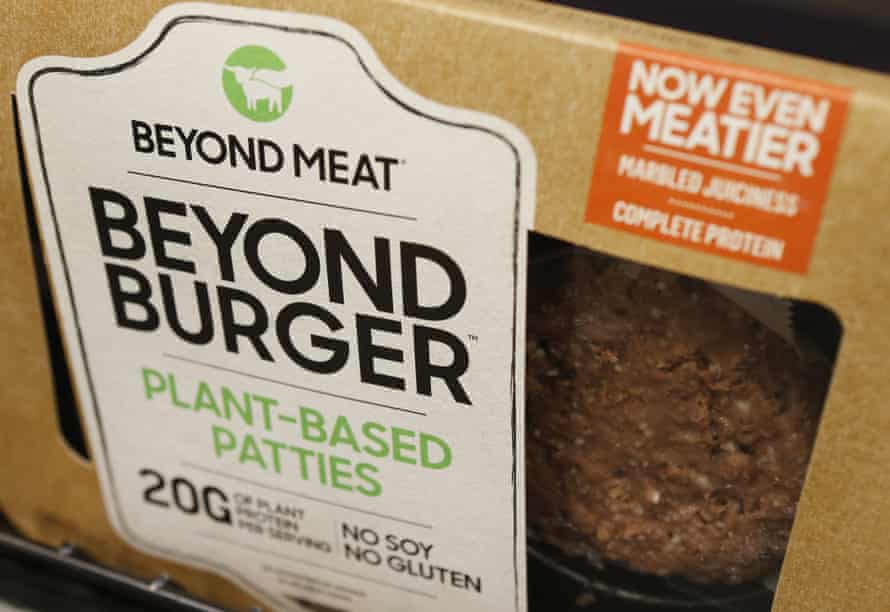[ad_1]
Whether it’s your native pub lastly including an choice to its menu for the primary time or a plant-based model of your favorite dessert hitting grocery store cabinets, the provision of vegan meals has come on leaps and bounds in recent times.
The variety of vegans within the UK quadrupled between 2014 and 2019, with 600,000 individuals placing themselves in that class, in keeping with information from the Vegan Society. Veganuary, the marketing campaign by which individuals go vegan for the month of January, reached a file 585,000 sign-ups this yr, in contrast with solely 3,300 in 2014.
There’s money within the development: the worldwide plant-based meat market alone was predicted to develop from $3.6bn (£2.6bn) in 2020 to $4.2bn by 2021, in keeping with the market analysis group Markets and Markets. Nevertheless, for people who need to put their cash the place their mouth is, the choices are usually not at all times apparent.
Which is unlucky as a result of Claire Smith, the chief govt of Past Investing, a vegan funding platform, and the creator of the US Vegan Local weather Index, says they’re typically socially and environmentally conscious and are more likely to be fascinated by what occurs to their money. “In the event that they’re labels and checking that the meals they eat is unquestionably not coming from an animal, they’re more likely to be involved about the place their cash goes,” she says.
Making use of vegan rules – reminiscent of avoiding corporations that take a look at on animals or exploit animals – to investments can contain a variety of analysis and can restrict the variety of corporations you possibly can put money into. Lee Coates, an moral cash and environmental, social and company governance guide, who has spent years researching the most effective funds for vegans to put money into, says they “don’t have a variety of alternative”.
Within the UK there’s no devoted fund to simply stash your cash in, and data on the place to take a position is tough to return by.
“One of the best method is to search for moral fund options which display out publicity to a variety of points, reminiscent of animal testing,” says David Henry, an funding supervisor at Quilter Cheviot. “It’s value chatting with a monetary adviser with entry to fund-screening instruments to make sure your funding decisions align along with your targets and your ethics.”
You should use an funding platform reminiscent of Constancy, AJ Bell or Hargreaves Lansdown to purchase these funds. Nevertheless, you will have to test the person holdings throughout the fund to see in the event that they comply along with your rules.
Coates says: “For instance, you might have a look at shopping for a pure windfarm fund and assume that’s not solely eco however vegan, however you’d have to have a look at whether or not there’s subsidiaries for enable grazing on the hillside, which may then imply it’s rented to a neighborhood farmer to generate income.”
Tech funds could seem a safer possibility however he says you “would want to have a look at their sourcing insurance policies and in the event that they undertake animal testing”. He provides that property might be good as “typically it’s ethically impartial”.
Coates recommends the Janus Henderson World Sustainable Fairness Fund, which invests in corporations contributing to constructive environmental or social change and is “financially very profitable and meets vegan standards”. He additionally suggests the Aegon Moral Fairness Fund and the Aegon Moral Company Bond, which he says persist with vegan rules – “for instance, no manufacturing facility farming, no retailing of meat and dairy”.
Alternatively, you might additionally make investments instantly by the inventory market, selecting cruelty-free corporations or pure vegan corporations. Many of those are listed on inventory markets outdoors the UK – reminiscent of Past Meat, the maker of the Past Burger, Else Diet, an Israeli producer of plant-based child formulation, or the US plant-based meals producer Tattooed Chef.

Haz Feliks, 40, a expertise enhanced studying supervisor residing in Aylesbury, invests in particular person firm shares by way of his lifetime Isa, his pension and a private buying and selling account. “Very similar to my on a regular basis and grocery purchases, it’s essential to me that I make moral decisions with my investments and financial savings,” he says. “Working in tech and being a tech fanatic, I’ve primarily been investing in expertise corporations, avoiding any firm that operates in or is related to animal agriculture.” He invested in Tesla early on and presently invests in Past Meat and different corporations “that meet the standards of being plant-based or technology-based”.
A vegan for the previous 4 years and the founding father of the specialist breakfast supply enterprise Oatsu, Lauren O’Donnell, 28, invests between £25 and £50 a month in moral funds and in addition holds shares in Past Meat and Oatly. “I attempt to concentrate on corporations which have been centered on a plant-based answer,” O’Donnell says. “There’s notably a lot alternative round meals in the meanwhile and, to an extent, clothes however with investments there could possibly be extra sources to make it simpler for traders who need to make extra sustainable and ethical-focused decisions.”
An alternative choice is to put money into vegan corporations by crowdsourcing fairness platforms reminiscent of Seedrs and Crowdcube. To date this yr, Seedrs says 42 companies with a plant-based focus have used its platform, up 400% on the earlier yr. One is the vegan chef-to-customer supply service Allplants, which raised £4.5m. Crowdcube experiences that greater than 4,000 retail traders have dedicated virtually £6m to vegan companies on its platform this yr.
Stephanie Peritore, 46, the founder and managing director of Aware Bites, invests in vegan corporations by her Isa and by way of crowdfunding.
“It provides me entry to deal flows to some phenomenal corporations reminiscent of Pip & Nut. I’ve invested in about 25 corporations and have a tendency to take a position round £20,000 every time.”

Most individuals’s largest funding is their pension, and also you may discover that your office pension is much from vegan. “You probably have been routinely enrolled on to a office pension, then you definately’ll doubtless be invested within the default fund possibility,” Henry says. “It’s value seeing if the pension scheme has an moral or sustainable fund possibility so that you can put money into as a substitute. Whereas it’s unlikely these funds will make investments solely on vegan grounds, they could exclude sure corporations. For instance, Nest’s moral fund will keep away from investing in corporations that take a look at cosmetics on animals and can solely put money into corporations that meet animal welfare codes of apply.”
Coates refers to a landmark ruling in 2020 the place moral veganism was deemed a philosophical perception and opened the door for individuals to have a proper to vegan-friendly pensions. “An excellent employer would perceive if you’d like a vegan pension,” Coates says. “Have a phrase along with your boss. Group along with different vegan staff.” He recommends the Aegon Moral Fairness Fund as a pension – whether or not you might be in a office pension or self-employed. In any other case – and one for the self-employed – it is perhaps finest to open a self-invested private pension, so you possibly can decide the funds your self.
[ad_2]
Source link







